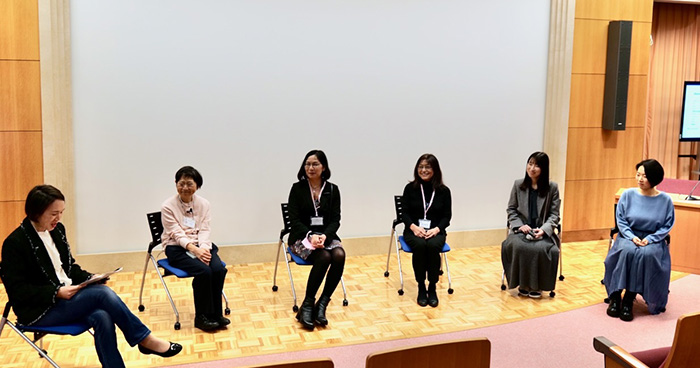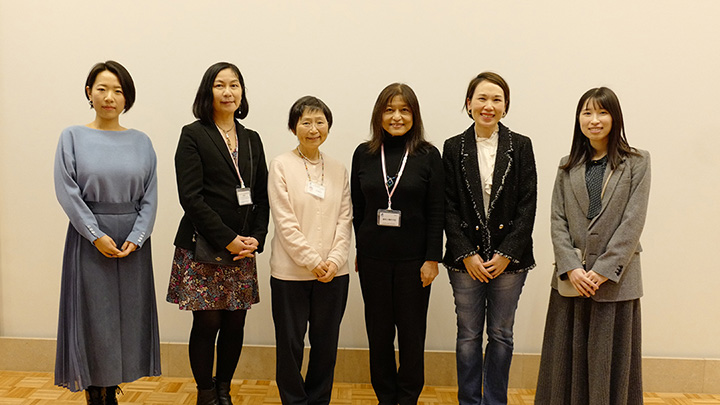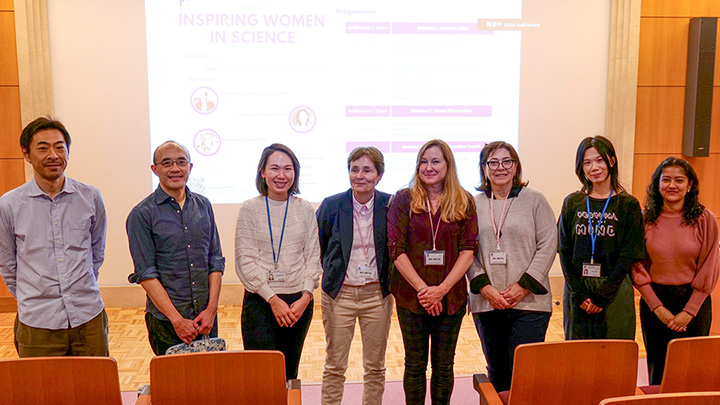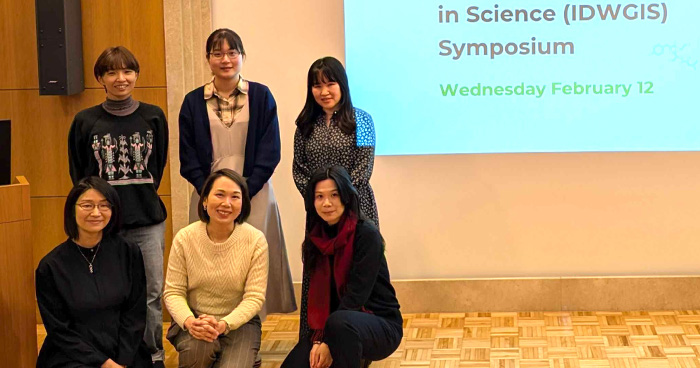Toward a Brighter Future for Women in ScienceIDWGIS Symposium Held at the BDR
Mar. 8, 2024
February 11 of every year is designated as the International Day of Women and Girls in Science (IDWGIS) by the United Nations’ General Assembly since 2015. To mark this special day, a half-day symposium, 2024 IDWGIS Symposium, was held on Friday, February 16, at the RIKEN Kobe campus that was open to all staff of RIKEN BDR to celebrate the activities of female researchers and have meaningful discussions on issues related to gender equality in science. The IDWGIS Symposium was organized by the BDR Diversity Working Group (WG), particularly Dr. Li-Kun Phng, team leader of the Laboratory for Vascular Morphogenesis, and Dr. Yu-Chiun Wang, team leader of the Laboratory for Epithelial Morphogenesis.
The Symposium opened with remarks from BDR Deputy Director Tomoya Kitajima who thanked the speakers for accepting the invitation and also reported on the current status of women researchers at the BDR. This was followed by invited lectures given by two internationally renowned women researchers, Professor Keiko Torii of the University of Texas at Austin, whose interest lies in mechanisms regulating tissue patterning during plant development, specifically the stomata, and Professor Hiromi Yanagisawa of the University of Tsukuba who is interested in matrix-cell interactions, mechanotransduction and their implications in various aortic and skin diseases. Both researchers are also actively involved in promoting diversity and leadership by women in science, and networking with young researchers. They each talked about their latest research and touched on their experiences as women in science.
In addition to the lectures by Drs. Torii and Yanagisawa, two young BDR researchers Dr. Hina Kosakamoto, a special postdoctoral researcher in the Laboratory for Nutritional Biology, and Duligengaowa Wuergezhen, an international program associate (graduate student) in the Laboratory for Tissue Microenvironment, gave short lectures on their recent research findings.

In the latter half of the Symposium was a panel discussion, in which the above four speakers were joined by RIKEN Executive Director Makiko Naka, who is also the Director of the RIKEN Diversity Promotion Office, to discuss the importance of increasing the number of women researchers in science, with Dr. Phng serving as the moderator. The first half of the panel discussion focused on the urgent need for more women at senior levels to increase female representation at management committees, to increase the diversity of research topics conducted and to create more female mentors for early-career women researchers, a particularly critical issue in Japan. The second half of the panel discussion was opened to the audience to receive additional opinions and questions pertaining to women in science. During the discussions there were proposals of specific measures that can be taken to help increase the number of women in management levels, such as implementing cross-appointments with universities, training on unconscious bias especially for those people involved in the recruitment process and also preparing a checklist that they can check during recruitment to minimize unconscious bias.
Dr. Phng stated:
“The severe underrepresentation of women researchers at leadership positions is a pressing issue in Japan. In RIKEN BDR, 10% of Team Leaders are women while only 4% of indefinite-term Team Leaders is a woman. These numbers show that BDR also trails behind other Japanese institutions such as the University of Tokyo and University of Tsukuba in having women in faculty positions. Furthermore, the numbers reflect a lack of equality and bias in the recruitment and retention of women scientists.
We were incredibly fortunate to receive so many constructive and valuable advice from Dr. Torii and Dr. Yanagisawa on measures that can be implemented to recruit, retain and promote women researchers in BDR. After listening to their personal scientific journeys, it was encouraging to learn that it is possible to succeed in academia with very different personalities and career paths. We were also very happy that Dr. Naka travelled to Kobe to share her vision for increasing diversity in RIKEN.”
On the significance of this event, Professor Torii commented that it demonstrated to the members of BDR that BDR's management level acknowledges the problem and is open to learning what actions can be taken to promote diversity, and it was noteworthy that these efforts were made visible to younger students and staff. She also stated, "I hope that events like this will continue to be held in the future and not just end as a one-time event.”
With this backing, the Diversity WG plans to hold similar events in the future, with each event focusing on a different theme that caters to different career stages and paths of women researchers (students, post-docs, technical staff) and to the Japanese demographic.

There were over 40 BDR researchers and students in attendance onsite for the Symposium and was also viewed virtually by other BDR members who were not able to attend in person. A networking session following the panel discussion also gave opportunities for attendees to meet and interact with all the speakers as well as with others in attendance.
The BDR Diversity WG has also been actively organizing the Women and Future in Science Seminar series, where women scientists, particularly those in early-career stages, who are carrying out cutting-edge research are invited to give seminars at BDR, which can also be viewed virtually by people outside BDR, as one approach to enhance visibility of women researchers in the scientific community. The next Women and Future in Science Seminar is scheduled for March 15, 2024.






